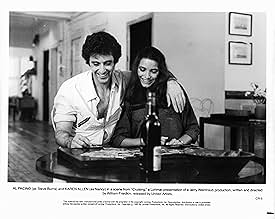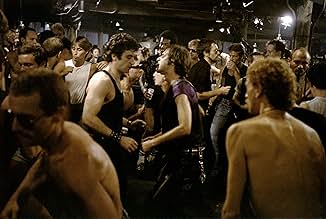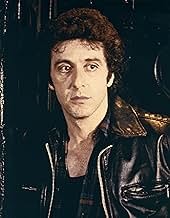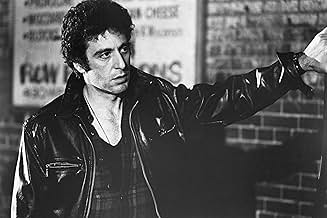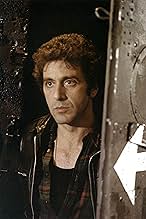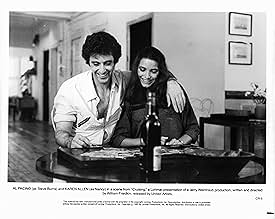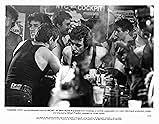Um detetive de polícia se disfarça na subcultura gay underground de Nova York para pegar um assassino em série que está matando homossexuais.Um detetive de polícia se disfarça na subcultura gay underground de Nova York para pegar um assassino em série que está matando homossexuais.Um detetive de polícia se disfarça na subcultura gay underground de Nova York para pegar um assassino em série que está matando homossexuais.
- Direção
- Roteiristas
- Artistas
- Prêmios
- 5 indicações no total
Ed O'Neill
- Det. Schreiber
- (as Edward O'Neil)
- Direção
- Roteiristas
- Elenco e equipe completos
- Produção, bilheteria e muito mais no IMDbPro
Avaliações em destaque
Knowing that this was inspired by true events and what really happened, I understand why the film may seem as one giant plot hole to some viewers. I know most people want a definitive answer and this movie doesn't exactly make it clear for the viewer. Done intentionally by Friedkin to reflect the true story's mystery, which I think is brilliant. That said, I wish the cast was hotter and I still can't believe Al Pacino did this film. I love it. It's such an amazing documented piece of Homosexual life before AIDS hit. Something we will never see or experience ever again.
William Friedkin is a mysterious, often mystifying film-maker. Although he rose to prominence at the same time as the rest of the so-called 'movie brat' generation of directors (Coppola, Spielberg, Scorsese, DePalma, et al.), he stands apart, even from a group as essentially disparate as this one. For one thing, his films lack the intertextual references and cinematic stylisation common to most of the other members. If he has an over-riding aesthetic, it would be the ugliness of the majority of human existence. He's not interested in prettifying his images or indulging in style-for-style's sake; which is not to say that his film's don't exhibit inventive and effective technique, just that this technique is always at the service of the story he's telling, and is often blunt and brutally effective in it's employment. All of this no doubt arises from his start in documentary film-making. Friedkin is particularly good at depicting the menace of urban environments, and the locales of a lot of his films are frightening, tangibly real places. Witness the sequences involving Karras' aged mother in 'The Exorcist', which for me are the most disturbing scenes in an often terrifying film. As we observe the elderly lady living alone in her shabby apartment in a crime-ridden neighbourhood, we realise that this is the existence that many millions of people are forced to endure, and it's oppressiveness adds immeasurably to the psychological impact of the film as a whole. We share Karras' fear and traumatising guilt that she died alone in such circumstances, and the special effects trickery of the climax is lent a genuine resonance.
Because of the stark, seemingly 'artless' force and apparent misanthropy of much of his work, a number of otherwise perceptive commentators dislike Friedkin intensely. Pauline Kael was extremely cool about 'The French Connection' and absolutely hated 'The Exorcist'. David Thompson described him as "essentially incompetent", bludgeoning the audience with blatant and obvious effects. In fact, Friedkin's best work is highly sophisticated in it's use of sound and music, and employs often visceral imagery to telling and subversive effect. However, some of his films ARE genuinely bloody awful, or at least depressingly mediocre. The very inconsistency of his work lies at the centre of the mystery that is his career. He seems to me to be a fiercely intelligent man whose art is driven by his life rather than the culture of film, and whose reportedly quixotic, often self-destructive personality in no small measure accounts for the expansive peaks and troughs of his cinematic achievements.
Friedkin has reassuring or comforting his audience way down the list of his priorities. In the case of 'Cruising', he neglected to add them at all. Because of this, 'Cruising' is a very difficult film to watch. Most film-makers, were they making a film set in such an alien and frightening environment, would go overboard on providing us with at least one protagonist we could identify with. But Friedkin takes the very opposite route and presents us entirely with characters who are abhorrent, sleazy or totally ambiguous. Indeed, ambiguity is the film's raison d'etre - we are never sure of anything, and this becomes both the pictures great strength and source of much audience frustration. It seems that unlike, say, Spielberg, who continually seeks the approbation of his audience, Friedkin actively resents his (or rather, their preconceptions and certainties), leading him to consistently challenge and upset them. This can be exciting to those who value such seditious manouveres, but dispiriting and destabilising for those that don't.
The major problem with evaluating 'Cruising' is that the film as it currently exists is seriously incomplete (apparently having been shorn of some 40 minutes of footage by the censors!). I suspect that a 'directors cut' should it ever emerge, although no doubt clarifying certain issues, would overall fail to dispel the central ambiguity that is so infuriating and troubling to the majority of the audience, and that lies at the heart of Friedkins vision. "What interests me is the very thin line between good and evil", the director once said when asked to provide a thematic overview of his work - and this is the core of 'Cruising'.
I would urge you to watch the film. It is a uniquely dark, brave piece somewhat compromised by well documented production difficulties and the censors scissors. It has a sinister, compelling momentum and wonderfully ugly, grainy textures that seep into your pores leaving you uncomfortable and unsettled. Sometimes a feel-bad movie can be as bracing as a winter morning. 'Cruising' is such an experience, and a fascinating, provocative one at that.
Because of the stark, seemingly 'artless' force and apparent misanthropy of much of his work, a number of otherwise perceptive commentators dislike Friedkin intensely. Pauline Kael was extremely cool about 'The French Connection' and absolutely hated 'The Exorcist'. David Thompson described him as "essentially incompetent", bludgeoning the audience with blatant and obvious effects. In fact, Friedkin's best work is highly sophisticated in it's use of sound and music, and employs often visceral imagery to telling and subversive effect. However, some of his films ARE genuinely bloody awful, or at least depressingly mediocre. The very inconsistency of his work lies at the centre of the mystery that is his career. He seems to me to be a fiercely intelligent man whose art is driven by his life rather than the culture of film, and whose reportedly quixotic, often self-destructive personality in no small measure accounts for the expansive peaks and troughs of his cinematic achievements.
Friedkin has reassuring or comforting his audience way down the list of his priorities. In the case of 'Cruising', he neglected to add them at all. Because of this, 'Cruising' is a very difficult film to watch. Most film-makers, were they making a film set in such an alien and frightening environment, would go overboard on providing us with at least one protagonist we could identify with. But Friedkin takes the very opposite route and presents us entirely with characters who are abhorrent, sleazy or totally ambiguous. Indeed, ambiguity is the film's raison d'etre - we are never sure of anything, and this becomes both the pictures great strength and source of much audience frustration. It seems that unlike, say, Spielberg, who continually seeks the approbation of his audience, Friedkin actively resents his (or rather, their preconceptions and certainties), leading him to consistently challenge and upset them. This can be exciting to those who value such seditious manouveres, but dispiriting and destabilising for those that don't.
The major problem with evaluating 'Cruising' is that the film as it currently exists is seriously incomplete (apparently having been shorn of some 40 minutes of footage by the censors!). I suspect that a 'directors cut' should it ever emerge, although no doubt clarifying certain issues, would overall fail to dispel the central ambiguity that is so infuriating and troubling to the majority of the audience, and that lies at the heart of Friedkins vision. "What interests me is the very thin line between good and evil", the director once said when asked to provide a thematic overview of his work - and this is the core of 'Cruising'.
I would urge you to watch the film. It is a uniquely dark, brave piece somewhat compromised by well documented production difficulties and the censors scissors. It has a sinister, compelling momentum and wonderfully ugly, grainy textures that seep into your pores leaving you uncomfortable and unsettled. Sometimes a feel-bad movie can be as bracing as a winter morning. 'Cruising' is such an experience, and a fascinating, provocative one at that.
Too many things wrong with this one to really care for it. The main problem is too much focus on over-the-top depictions of the gay S&M subculture, and not enough on its characters. The undercover cop (Al Pacino), his girlfriend (Karen Allen), and the killer (???) are all ridiculously underdrawn. We don't get enough of what's going through the cop's mind as he's undercover, the girlfriend is only there to serve as a barometer of his heterosexuality, and the killer has some cliché "daddy issues." We do, however, get public fisting ffs.
Especially for 1980, it's unfortunate that this was the window mainstream America got into gay life, as it felt voyeuristic and intended to shock, not serve as a source of understanding or empowerment, at least as best possible as a backdrop to a murder mystery. Maybe the neighbor character, the aspiring writer, was intended to balance some of this out, but he was quickly lost, perhaps by things like the ridiculous man in the precinct house wearing nothing but a jockstrap and walking into interrogations to slap gay suspects around. What the hell was that?
I loved the little bits critiquing the police department at various levels - the beat cops harassing guys on the street and forcing one to perform oral sex, the captain (Paul Sorvino) who too quickly looks the other way, and the chief of detectives who doesn't really empathize with the victims, only wanting to avoid untimely negative publicity. It's too bad more wasn't done with this, but maybe there was a moment of transformation in the captain finding that last body.
The story doesn't really hold together as a police procedural, however. Maybe the film didn't want us to think about Pacino's character having to go home with guys to be effective at his assignment, so a lot of the time, he's just standing around in a bar, watching the raunchy antics of the wild crowd. Early on we're made to understand he's working for the captain only, with no one else knowing about it, but then in one critical scene swarms of cops come to his aid - only to then disappear at the end, when he acts completely alone again. There are also attempts at adding ambiguity into the story in several ways, but they all felt more forced than intriguing.
It's Pacino's character that ends up being the real mystery. You could see this as a man whose bisexuality is awakened, that he goes home with enough men like the guy we see him following out of the park that he loses interest in his girlfriend, and then later knows the repartee well in the climactic encounter. You could also see it as a straight man who has been overwhelmed by what he's seen and done, so much so that his relationship suffers along the way, and even when he's back with her at the end, he's liable to suffering flashbacks and trauma. It was interesting pondering that, but it felt like the film was being less artistic in its ambiguity, and more inhibited by what it felt it could show in a 1980 Hollywood production with a big star like Pacino. Regardless, it was less than completely satisfying, like everything else here.
Especially for 1980, it's unfortunate that this was the window mainstream America got into gay life, as it felt voyeuristic and intended to shock, not serve as a source of understanding or empowerment, at least as best possible as a backdrop to a murder mystery. Maybe the neighbor character, the aspiring writer, was intended to balance some of this out, but he was quickly lost, perhaps by things like the ridiculous man in the precinct house wearing nothing but a jockstrap and walking into interrogations to slap gay suspects around. What the hell was that?
I loved the little bits critiquing the police department at various levels - the beat cops harassing guys on the street and forcing one to perform oral sex, the captain (Paul Sorvino) who too quickly looks the other way, and the chief of detectives who doesn't really empathize with the victims, only wanting to avoid untimely negative publicity. It's too bad more wasn't done with this, but maybe there was a moment of transformation in the captain finding that last body.
The story doesn't really hold together as a police procedural, however. Maybe the film didn't want us to think about Pacino's character having to go home with guys to be effective at his assignment, so a lot of the time, he's just standing around in a bar, watching the raunchy antics of the wild crowd. Early on we're made to understand he's working for the captain only, with no one else knowing about it, but then in one critical scene swarms of cops come to his aid - only to then disappear at the end, when he acts completely alone again. There are also attempts at adding ambiguity into the story in several ways, but they all felt more forced than intriguing.
It's Pacino's character that ends up being the real mystery. You could see this as a man whose bisexuality is awakened, that he goes home with enough men like the guy we see him following out of the park that he loses interest in his girlfriend, and then later knows the repartee well in the climactic encounter. You could also see it as a straight man who has been overwhelmed by what he's seen and done, so much so that his relationship suffers along the way, and even when he's back with her at the end, he's liable to suffering flashbacks and trauma. It was interesting pondering that, but it felt like the film was being less artistic in its ambiguity, and more inhibited by what it felt it could show in a 1980 Hollywood production with a big star like Pacino. Regardless, it was less than completely satisfying, like everything else here.
Crusing is a very dark psychological thriller from acclaimed director William Friedkin and leading man Al Pacino. Based on true events where a serial killer preyed on gay men part of the S+M gay leather scene in NYC, pre AIDS, where casual sex or cruising was a big thing in that scene. Al Pacino goes deep undercover to attempt to bring down the killer. This film only shows one side of the gay community, which was controversial and brought a polarizing reaction in the gay community in that time. The gay S+M clubs, parks and other areas of NY are the backdrop to this sleazy, violent and downbeat thriller. Al Pacino is excellent, as is the support cast of Paul Sorvino, Joe Spinell and Karen Allen as Pacino's girlfriend. The film is similar in a lot of ways to the Italian giallo films and it seemed to borrow some of its ambiance and style. While most of what happens in the film is pretty ambigious, it seems that as the film progresses Al Pacino seems to identify more with the gay community. This film is very well done and very much in the 70's style, gritty, suspenseful and uncompromising in its presentation. Crusing certainly will not appeal to everyone, but for those that like this kind of film, it is very well done.
Viewed today, "Cruising" still elicits intense responses from both Gay and straight viewers alike. Mainstream Gays lament, as many protestors of the film at the time of its release, that it shows a homophobic image of Gay life, depecting them as sex-obsessed. Straights are put off by the frank look at the Gay sex "cruising" culture.
Interesting, however, some of the people involved in the Leather/SM subculture at the time this film was made have praised it for its accuracy of this particular lifestyle -- a pre-AIDS lifestyle concentrated on quick sex that was (and still is) pursued by a segment of the Gay community.
The film does not pretend to depict Gays as a whole. It is just a drama about a police investigation that uses the scene as a background and catalyst for an exploration into how one cop is affected by his work.
Not the greatest film ever made, but certainly a good springboard for discussion about the Gay community's politics, when one fully examines the controversy surrounding the film and the continued debate over public sex and body image in the community.
The strengths of "Cruising" are its use of locales and documentary-style cinematography, as well as the interesting performance from Paccino. In the end, it is hampered as a drama by problems with the narrative structure of the piece that seems to fizzle out in the last act, leading to an intriguing, but inconclusive, finish.
Interesting, however, some of the people involved in the Leather/SM subculture at the time this film was made have praised it for its accuracy of this particular lifestyle -- a pre-AIDS lifestyle concentrated on quick sex that was (and still is) pursued by a segment of the Gay community.
The film does not pretend to depict Gays as a whole. It is just a drama about a police investigation that uses the scene as a background and catalyst for an exploration into how one cop is affected by his work.
Not the greatest film ever made, but certainly a good springboard for discussion about the Gay community's politics, when one fully examines the controversy surrounding the film and the continued debate over public sex and body image in the community.
The strengths of "Cruising" are its use of locales and documentary-style cinematography, as well as the interesting performance from Paccino. In the end, it is hampered as a drama by problems with the narrative structure of the piece that seems to fizzle out in the last act, leading to an intriguing, but inconclusive, finish.
Você sabia?
- CuriosidadesTwo of the notorious gay bars featured in the film - Mine Shaft and Eagle's Nest - eventually barred William Friedkin.
- Erros de gravaçãoWhen the first victim gets stabbed blood is shown running off his shoulder but the knife is spotless.
- Citações
Steve Burns: Hips or lips?
- Cenas durante ou pós-créditosThe film only opens with the title in large letters, across the screen. It is only at the end where the filmmakers are credited.
- Versões alternativasUK cinema and 1987 video versions were cut by 54 secs by the BBFC. The 1997 Maverick Directors video release was cut by 39 seconds to remove subliminal shots of anal sex during the murder scenes (one of which appears in the film though heavily darkened) and to edit a pan shot of a gay bar interior and shots of a knife being traced over a bound victims body. Although the uncut version was shown by Sky TV the film was resubmitted to the BBFC in 2003 for a FilmFour showing and many cuts were restored apart from a 1 sec edit to remove the subliminal shots. For the initial release on UK DVD in 2008 all the cuts were waived.
- Trilhas sonorasThree-Day Moon
Performed by Barre Phillips
Principais escolhas
Faça login para avaliar e ver a lista de recomendações personalizadas
- How long is Cruising?Fornecido pela Alexa
Detalhes
- Data de lançamento
- Países de origem
- Idioma
- Também conhecido como
- Encrucijadas
- Locações de filme
- Empresas de produção
- Consulte mais créditos da empresa na IMDbPro
Bilheteria
- Orçamento
- US$ 11.000.000 (estimativa)
- Faturamento bruto nos EUA e Canadá
- US$ 19.798.718
- Faturamento bruto mundial
- US$ 19.815.314
Contribua para esta página
Sugerir uma alteração ou adicionar conteúdo ausente



